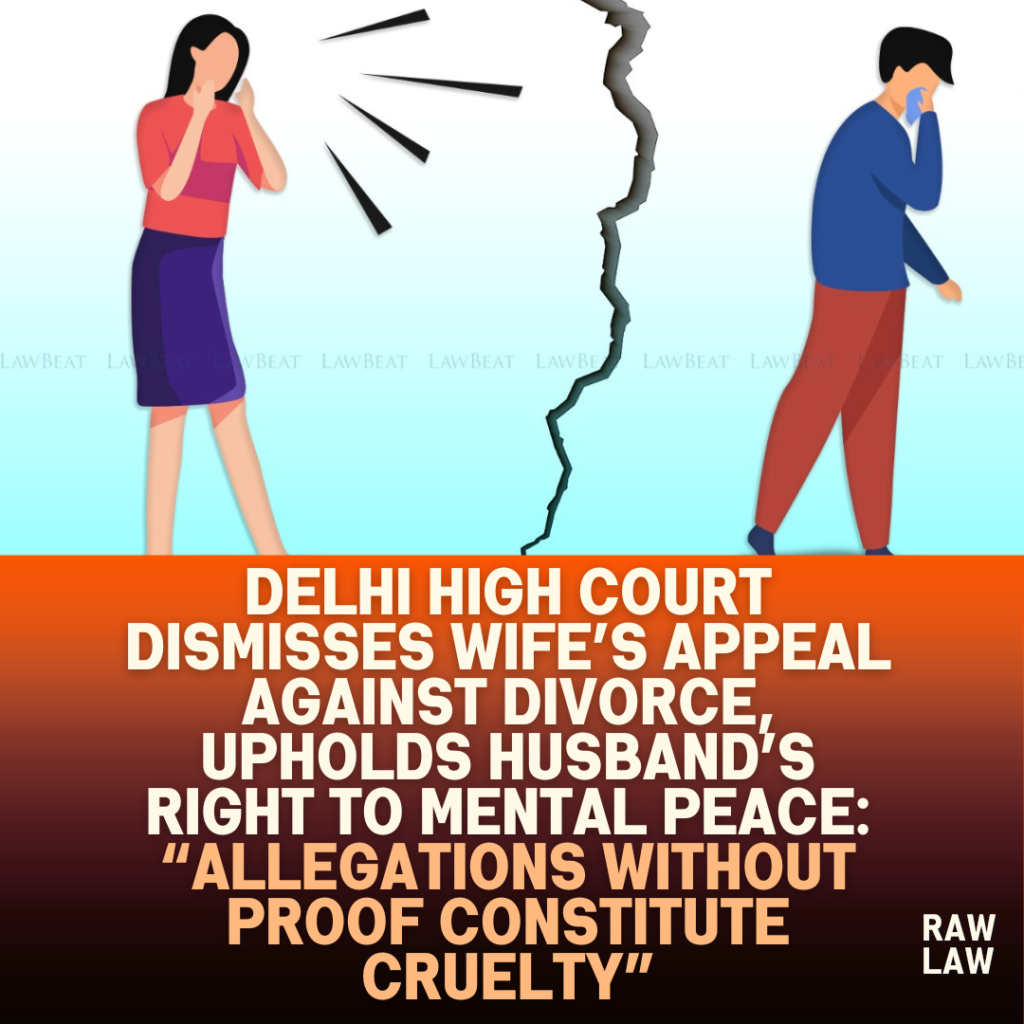Court’s Decision
The Delhi High Court dismissed the wife’s appeal challenging a Family Court decree granting divorce to the husband on the ground of cruelty under Section 13(1)(ia) of the Hindu Marriage Act, 1955. The Court held that false allegations of dowry demand, unsubstantiated criminal complaints, and consistent harassment by the wife amounted to mental cruelty, making it unreasonable to expect the husband to continue the marriage.
The Court remarked:
“The cumulative effect of such conduct reflects a clear departure from the normal standards of conjugal life and goes beyond the ordinary wear and tear of a matrimonial relationship.”
Facts
The parties married in 2010 under Hindu rites. No child was born from the marriage, and they began living separately in 2012. The husband filed a divorce petition alleging that the wife was quarrelsome, demanded expensive jewellery, was extravagant despite his financial condition, and that her family misbehaved with him, necessitating police intervention. The wife filed an FIR under Section 498A IPC and a domestic violence petition, both of which were later dismissed.
Conversely, the wife alleged that the husband and his family demanded dowry, physically assaulted her, and attempted to kill her by pouring hot oil when she refused to meet their demands. She claimed that repeated demands, beatings, and dowry harassment compelled her to approach the police and the courts.
Issues
- Whether the Family Court erred in granting divorce on the ground of cruelty.
- Whether the wife’s allegations of dowry harassment and physical abuse were proved.
- Whether filing of criminal complaints, later found false, constituted mental cruelty.
Petitioner’s Arguments
The wife argued that the Family Court selectively relied upon the husband’s testimony while ignoring her evidence, including photographs, medical records, and her brother’s testimony. She contended that allegations against her lacked specific dates and that the Family Court disregarded the ordeal she faced, including her pending appeals against dismissals of her criminal complaints and domestic violence petitions.
Respondent’s Arguments
The husband argued that the judgment was well-reasoned and legally sound. He highlighted that he and his family were acquitted in the Section 498A IPC case, and the domestic violence petition was dismissed, establishing that the wife’s allegations were false. He submitted that the consistent harassment, false cases, and mental agony inflicted upon him amounted to cruelty.
Analysis of the Law
Under Section 13(1)(ia) of the Hindu Marriage Act, cruelty includes mental cruelty, where it becomes unreasonable to expect the petitioner to continue the marital relationship due to the conduct of the spouse.
The Court highlighted the principles laid down in Chetan Dass v. Kamla Devi (2001) 4 SCC 250, emphasizing the sensitive and delicate nature of matrimonial relationships, requiring mutual trust and respect. It reiterated that the preponderance of probabilities governs matrimonial disputes, and the court must examine the evidence in totality.
Precedent Analysis
1. Chetan Dass v. Kamla Devi (2001) 4 SCC 250: Emphasized the need for mutual trust and adjustment in marriage, forming the foundation for assessing cruelty claims.
2. Ritesh Babbar v. Kiran Babbar, 2022 SCC OnLine Del 726: Held that unsubstantiated allegations of dowry and harassment can constitute mental cruelty warranting divorce.
3. Mangayakarasi v. M. Yuvaraj (2020) 3 SCC 786: Established that false criminal cases, if proved to be baseless, constitute mental cruelty.
4. K. Srinivas v. K. Suneetha (2014) 16 SCC 34: Held that knowingly filing false complaints against a spouse and their family amounts to cruelty under Section 13(1)(ia).
The Court relied on these judgments to affirm that the wife’s repeated false allegations and misuse of legal processes caused grave mental cruelty to the husband.
Court’s Reasoning
The Court found no material evidence substantiating the wife’s allegations of dowry demands or physical abuse. It noted that:
- Her complaints under Section 498A IPC and the Domestic Violence Act were dismissed.
- The allegations regarding the hot oil incident lacked medical evidence or police complaints contemporaneous with the alleged incident.
- She continued to live with the husband after the alleged incidents, contradicting her claims.
- The repeated filing of false complaints and the husband’s subsequent custody and harassment amounted to mental cruelty, rendering the continuation of marriage unreasonable.
The Court emphasized that the cumulative effect of repeated false allegations, police complaints, and litigation can constitute cruelty even if individual incidents may appear minor.
Conclusion
The Delhi High Court dismissed the wife’s appeal and upheld the Family Court’s decree of divorce under Section 13(1)(ia) of the Hindu Marriage Act, finding no infirmity in the reasoning of the Family Court. It held that the husband successfully proved mental cruelty due to the wife’s conduct, making it unreasonable for him to continue the marital relationship.
All pending applications were disposed of as infructuous.
Implications
Establishes that making false allegations or misusing legal provisions to harass a spouse amounts to cruelty, providing valid grounds for divorce.
Clarifies that oral testimony alone is insufficient to prove dowry harassment; credible and corroborative evidence is necessary.
Highlights the importance of presenting consistent and reliable evidence in matrimonial disputes.
Serves as a caution against misusing criminal law provisions in marital conflicts, emphasizing the legal consequences of filing false complaints.
FAQs
1. Can false allegations of dowry demand lead to a divorce decree for cruelty?
Yes, if false allegations lead to criminal cases and harassment, it can amount to mental cruelty, as reaffirmed in this case.
2. Does living together after alleged cruelty weaken a claim of harassment?
It can, as continued cohabitation may indicate reconciliation or undermine the credibility of serious allegations.
3. Is oral testimony enough to prove cruelty in matrimonial disputes?
Not alone; the court weighs oral testimony alongside corroborative evidence under the preponderance of probabilities.



